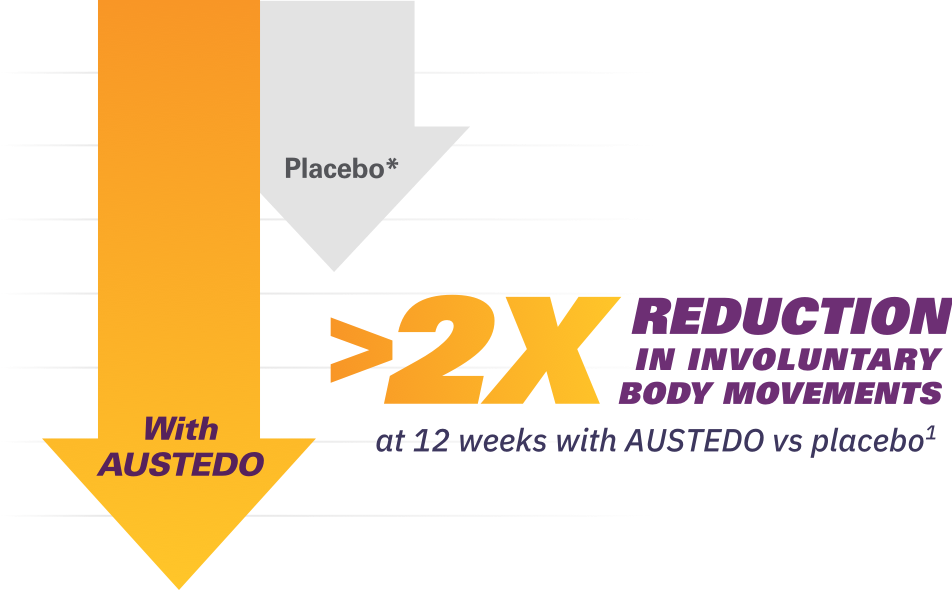Track your progress
Download the HD Chorea Treatment Tracking Guide to record when
AUSTEDO XR is taken and note any questions for your doctor.
Voucher and NEW Patient Copay Assistance information is now available here
Once-daily AUSTEDO XR (deutetrabenazine) extended-release tablets contains the same active ingredient as twice-daily AUSTEDO (deutetrabenazine) tablets. Data on this page is based on twice-daily dosing. 1
People taking AUSTEDO saw more than
2x reduction in HD chorea vs placebo.*

*4.4-point improvement in people taking AUSTEDO vs 1.9 in people taking placebo based on Total Maximal Chorea (TMC) score. The TMC score is used to measure HD chorea movements in the face, mouth, trunk, both arms, and both legs.1,2
~3 years3†
†Mean TMC score changed minimally from Week 8 to Week 132 (or end of treatment).3
This was an open-label study, which is a drug trial in which all participants are aware of the drug being tested.4
Both doctors and people with HD chorea on AUSTEDO rated symptoms as “very much improved” or “much improved” at 12 weeks with AUSTEDO.
‡Treatment success is measured by perceived improvement in TMC score.


People taking AUSTEDO achieved greater improvement in the SF-36§ Physical Functioning Score at 12 weeks vs placebo.
See study details§SF-36=36-Item Short Form Health Survey assessing health-related quality of life.
AUSTEDO XR/AUSTEDO does not cure the cause of the involuntary movements and it does not
treat the other symptoms of HD, such as problems with thinking or emotions.1
Download the HD Chorea Treatment Tracking Guide to record when
AUSTEDO XR is taken and note any questions for your doctor.
Whether you're ready to start medication or planning
ahead, talking to a doctor is the first step.
The information on this site is intended for healthcare professionals in the United States. Are you a healthcare professional in the United States?
AUSTEDO® XR (deutetrabenazine) extended-release tablets and AUSTEDO® (deutetrabenazine) tablets are prescription medicines that are used to treat:
It is not known if AUSTEDO XR and AUSTEDO are safe and effective in children.
AUSTEDO XR and AUSTEDO can cause serious side effects in people with Huntington’s disease, including: depression, suicidal thoughts, or suicidal actions. Do not start taking AUSTEDO XR or AUSTEDO if you are depressed (have untreated depression or depression that is not well controlled by medicine) or have suicidal thoughts. Pay close attention to any changes, especially sudden changes, in mood, behaviors, thoughts or feelings. This is especially important when AUSTEDO XR or AUSTEDO is started and when the dose is changed. Call your healthcare provider right away if you become depressed, have unusual changes in mood or behavior, or have thoughts of suicide.
Do not take AUSTEDO XR or AUSTEDO if you:
Other possible serious side effects include:
Sleepiness (sedation) is a common side effect of AUSTEDO XR and AUSTEDO. While taking AUSTEDO XR or AUSTEDO, do not drive a car or operate dangerous machinery until you know how AUSTEDO XR or AUSTEDO affects you. Drinking alcohol and taking other drugs that may also cause sleepiness while you are taking AUSTEDO XR or AUSTEDO may increase any sleepiness caused by AUSTEDO XR and AUSTEDO.
The most common side effects of AUSTEDO in people with Huntington’s disease include sleepiness (sedation), diarrhea, tiredness, and dry mouth.
The most common side effects of AUSTEDO in people with tardive dyskinesia include inflammation of the nose and throat (nasopharyngitis) and problems sleeping (insomnia).
The most common side effects of AUSTEDO XR are expected to be similar to AUSTEDO in people with Huntington’s disease or tardive dyskinesia.
These are not all the possible side effects of AUSTEDO XR or AUSTEDO. Call your doctor for medical advice about side effects. You are encouraged to report side effects of prescription drugs to the FDA. Visit www.fda.gov/medwatch or call 1-800-FDA-1088.
Please read the accompanying Medication Guide.
References:
1. AUSTEDO® XR (deutetrabenazine) extended-release tablets/AUSTEDO® tablets current Prescribing Information. Parsippany, NJ: Teva Neuroscience, Inc.
2. Data on file. Parsippany, NJ: Teva Neuroscience, Inc.
3. Frank S, Testa CM, Stamler D, et al; Huntington Study Group ARC-HD Investigators. Long-term efficacy and safety of deutetrabenazine for chorea in Huntington's disease: results from the ARC-HD open-label study. Poster presented at: the 27th Annual Meeting of the Huntington Study Group (HSG); October 29-31, 2020.
4. Open-label. Merriam-Webster. Accessed March 13, 2023. https://www.merriam-webster.com/dictionary/open-label#medicalDictionary
5. Burgess JC, Davis B, Fogarty E, et al. Caregiver Guide for Mid to Late Stage Huntington's Disease: For Long-Term Care Facilities and In-Home Care Agencies. Huntington's Disease Society of America; 2014. Accessed February 27, 2023. http://hdsa.org/wp-content/uploads/2015/04/CaregiverGuide_Mid_Late_StageHD.pdf

